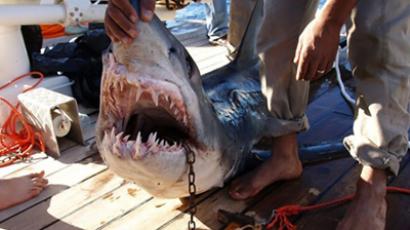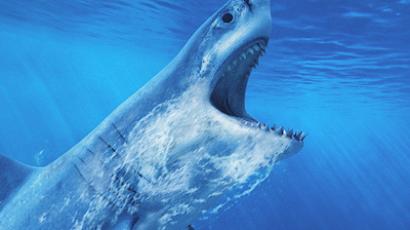Jaws 2.0: Freak shark attacks in Russia's Far East
A killing machine has invaded Russian waters as two men have so far fallen victim to a shark attack in the country's Far East.
Patrol boats are sweeping the area on the lookout for the deadly monster, while local authorities have promised over $3,000 to the person who can catch the creature from the deep.Nothing of a kind has ever happened in Russia before. The country has never seen a shark attack, let alone two in two days.This 16-year old boy was diving 100 meters offshore when it appeared. The young man’s wetsuit served as protection and saved him from death, but both his legs were severely wounded. “We heard a cry: ‘Help! Help! A shark!’ I have a big boat but it was tied up, so some guys went out on two dinghies, they saved him and gave first aid,” witness Yury Umantsev said. Only a day earlier, a 25-year-old man lost his forearms trying to defend his wife. When the couple were rescued, witnesses were shocked at what they saw.“It was really scary. I can’t even describe it! The man’s hands were chewed off and the boat was full of blood,” witness Alyona Semyonova remembered.The tooth marks were all over the man’s body. Doctors say they had seen people after bear and tiger attacks, but this is the first time they have dealt with sharks.“The victim does recall fighting the shark. He saw a big fish with fins, about two meters long – he fought it in the sea and says it dragged him to the ocean floor twice,” Dr. Alexander Gibatulin said. The attacks happened in the Far Eastern Primorye region that shares a border with North Korea. It is known for its sandy beaches and clear water and swimming here has always been safe. Dangerous sharks do not usually go that far north in the Sea of Japan. Scientists believe the predator was a white shark – a man-eater – and are trying to work out what it was doing here.“This type of shark rarely comes to our waters. It’s a species that lives in the tropical and subtropical waters of the ocean, but with global warming they are now starting to move more to the north,” Alexander Sokolovsky, la eading expert at the Institute of Marine Biology, explained. Out of roughly 360 species of sharks, just over 30 are known to be dangerous to humans. The rest are either too small or live too deep. But most experts agree that any shark over 1.2 meters and with sharp enough teeth can cause serious injuries, especially if there is food or blood in the water.However, the majority of shark experts also agree that the danger from sharks is often exaggerated. There are even those who defend the predators, saying people themselves are to blame for unwanted visits.“Humans have fished out the shark's food supply and lure them in by throwing leftovers overboard. But statistics show that fewer than one person per year on average is killed by sharks worldwide. But in response, we humans kill more than 100 million sharks every year,” Gurevich Ilya from Moscow’s Ocean Aquarium said. And while scientists keep on looking for the reasons for these recent attacks – the swimming season in the area is over, at least for the time being.














